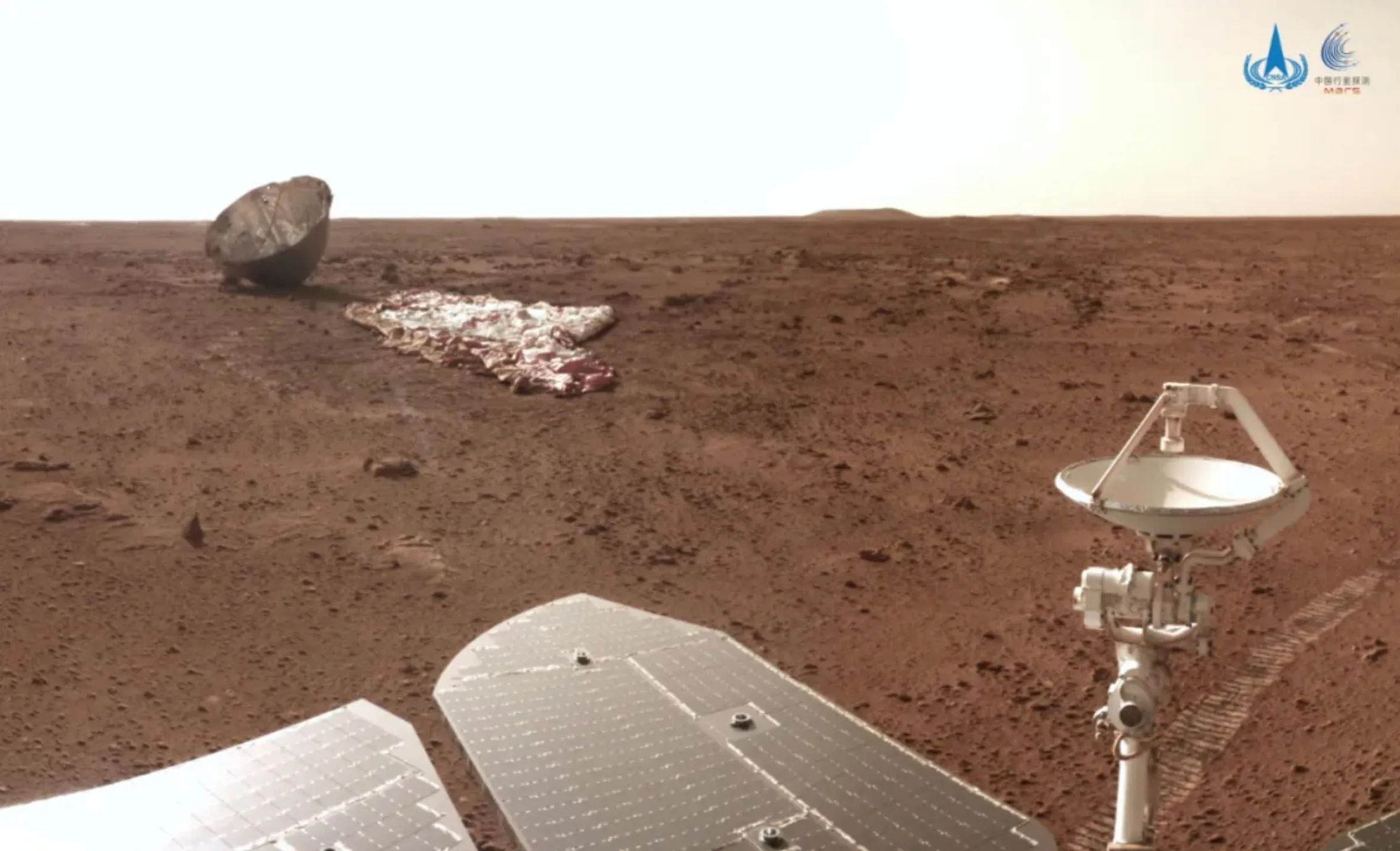25.04.2023
Mobile sampling component will be part of mission to collect 500 grams of Red Planet material

China's Zhurong images its own parachute from a distance of 30 meters, July 12, 2021. Credit: CNSA/PEC
HELSINKI — China is sharpening the details of its Tianwen-3 mission to collect samples from Mars and deliver them to Earth.
New mission details and defined objectives were revealed in presentations made at the International Conference of Deep Space Sciences in Hefei, Anhui province, April 22.
The mission will use a pair of Long March 5 rockets to send two separate spacecraft stacks towards the Red Planet around 2030 with the goal of collecting and returning 500 grams of samples.
The mission objectives include searching for evidence for life on Mars, understanding environmental and climate evolution of the Red Planet and its potential past habitability.
The two Long March 5 launches will carry a lander and ascent vehicle and an orbiter and return module respectively. Entry, descent and landing will build on technology used for the Zhurong rover landing as part of China’s Tianwen-1 Mars mission.
Sampling will, as with China’s 2020 Chang’e-5 lunar sample return mission, use a lander-based robotic arm to collect surface samples and a drill to collect material from up to two meters below the surface.
In a new development, the landing segment will also have limited capacity to collect samples close to the landing site, using either a six-legged crawling robot or an Ingenuity-like helicopter. The Chinese Academy of Sciences (CAS) unveiled a prototypeof the latter in 2021.
Collected samples will be sent into Mars orbit using a two-stage ascent vehicle. It will consist of a solid first stage and liquid propellant upper stage with a total mass of at least 360 kilograms.
The ascent vehicle will then dock with the orbiter and return module, with docking assisted by a robotic arm. Collected materials will then be transferred to the return module for the return to Earth.
The vague timeline for launch suggests, but does not confirm, a slip from a previously stated 2028 launch timetable.
A mission profile for China’s Mars sample return presented in June 2022 targeted launch in late 2028 with samples delivered to Earth in July 2031.
The 2028 timeline would see samples delivered to Earth before the NASA-ESA Mars Sample Return mission. The mission likewise targets delivering around 500 grams of Martian samples to Earth.
Landing site selection is being conducted with invited input from international teams. Engineering constraints mean the landing will take place between 17 and 30 degrees north latitude, due to energy and lighting requirements. The landing ellipsis will be 50 by 20 kilometers.
Prospective sites required to have an elevation of at least 3,000 meters below the zero-elevation level, or the equivalent to sea level on Earth. This provides the lander with more atmosphere to move through to slow its descent onto the Martian surface.
Site selection will also be balanced by science objectives. The chosen site will need to be considered of astrobiological relevance, with Martian terrain older than 3.5 billion years being prioritized.
Environments suitable for the emergence of life and its preservation such as sedimentary or hydrothermal systems, evidence of past aqueous activity and geological diversity were noted as key priorities. The
The mission will also adhere to the highest standards of planetary protection protocols, according to the presentations.
Liu Jizhong of the director of China’s Lunar Exploration and Space Program Center under the CNSA, and Hou Zengqian of the Institute of Geology, Chinese Academy of Geological Sciences delivered the presentations in Hefei, which were later shared on Chinese social media.
Quelle: SN
